Upcoming Events
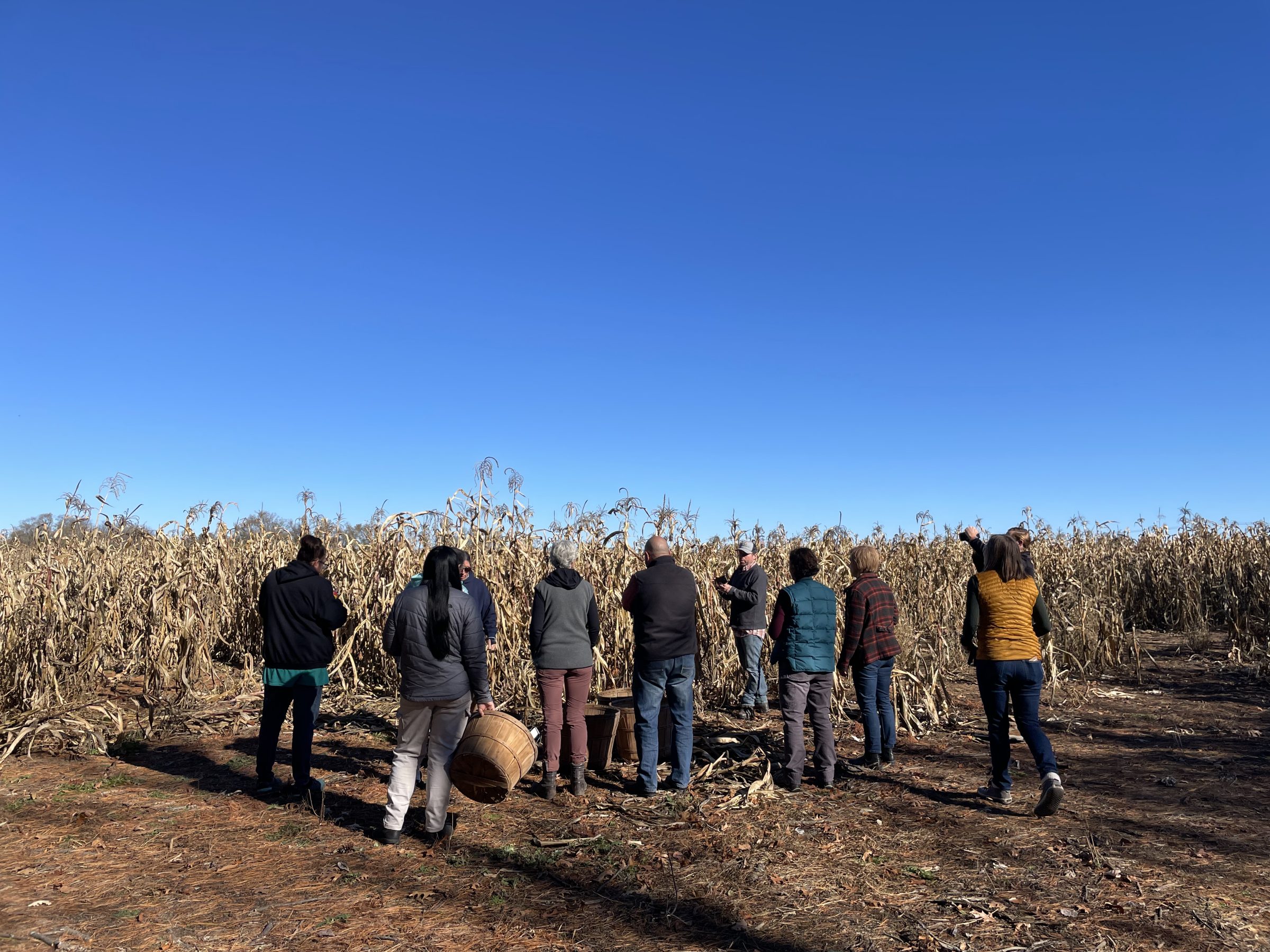
Upcoming Events
What We Do
To sign up to receive email notifications about upcoming Tribal producer trainings and events, please fill out this form.
Mechanical Weed Management for Indigenous Corn Webinar Series
Want to scale up Indigenous corn production, but don’t know how to stay on top of all the weeds?
Join us for a Tribal training series focused on mechanical weed management for Indigenous corn. The goal of these webinars is to provide information on the basics of weed management and how to approach mechanical weed control in Indigenous corn.
- March 16, 2026 from 12-1 PM CST: Basics of Weed Management
- April 6, 2026 from 12-1:30 PM CST: Introduction to Mechanical and Cultural Weed Management in Indigenous Corn
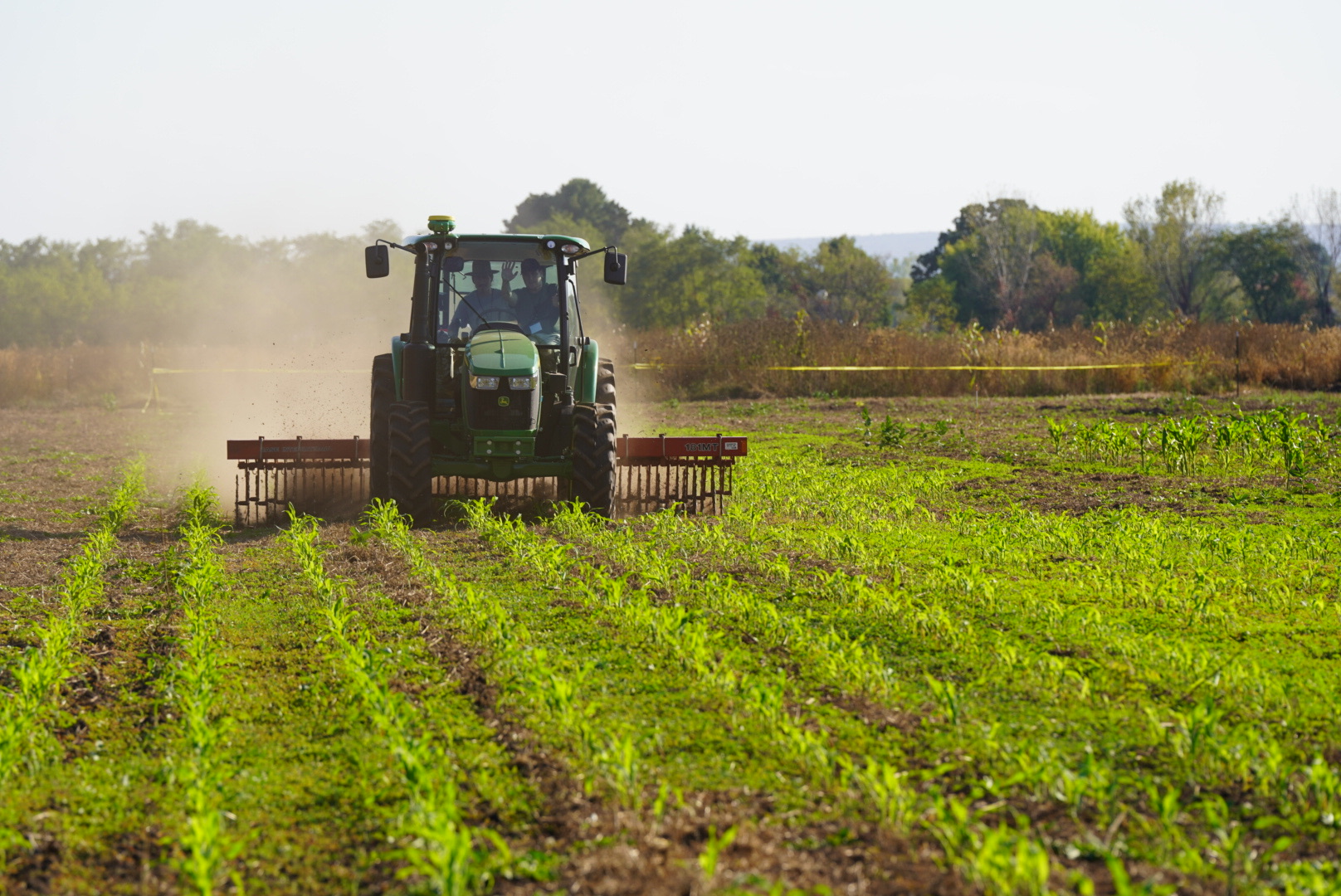
Tribal Maple Syrup Season Check-In
March 26, 2026 on Zoom
Join us for an online meet-up to check in on this year’s maple syrup season. Connect with fellow Tribal maple producers and share how your season is progressing.
Enjoy live sugarbush tours from:
- Jerry Jondreau (Dynamite Hill Farm)
- Bruce Savage (Spirit Lake Native Farms)
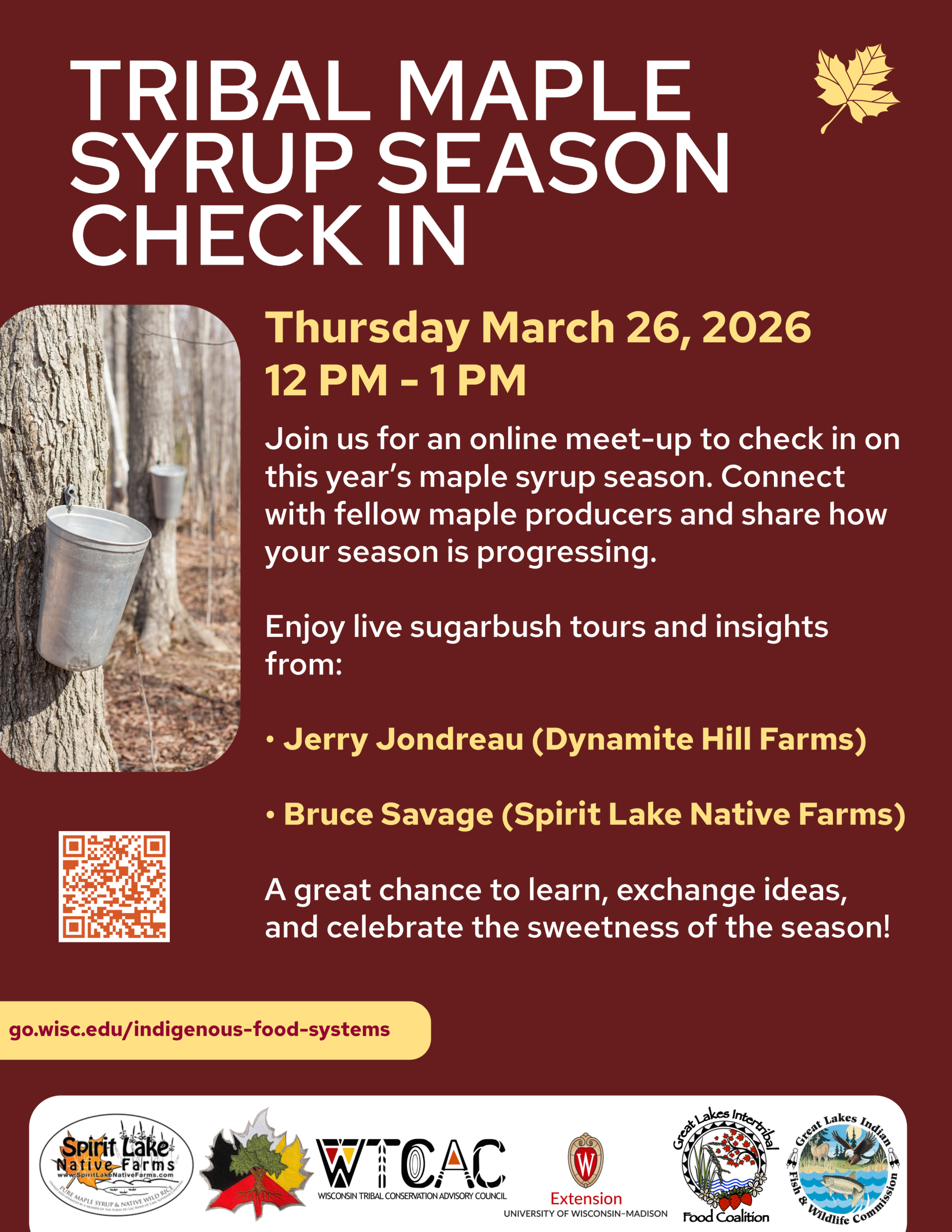
Tribal Food Systems Webinar Series
Join the UW-Madison Indigenous Food Systems Resilience Project and UW Extension for an ongoing webinar series focused on priority topics for Tribal staff, food producers, and community members. These webinar are open to all who are interested in these topics.
2026 Dates:
- March 25 from 12-1 PM CST: Vegetable Crop Season Planning
- April 8 from 12-1 PM CST: Introduction to Organic Certification
- May 6 from 12-1 PM CST: Weed Management in Gardens and Vegetables
- May 20 from 12-1 PM CST: topic not yet scheduled
- June 3 from 12-1 PM CST: topic not yet scheduled
- June 17 from 12-1 PM CST: topic not yet scheduled
- July 1 from 12-1 PM CST: topic not yet scheduled
- August 5 from 12-1 PM CST: topic not yet scheduled
- September 2 from 12-1 PM CST: topic not yet scheduled
- October 7 from 12-1 PM CST: topic not yet scheduled
- November 4 from 12-1 PM CST: topic not yet scheduled
- November 18 from 12-1 PM CST: topic not yet scheduled
- December 2 from 12-1 PM CST: topic not yet scheduled
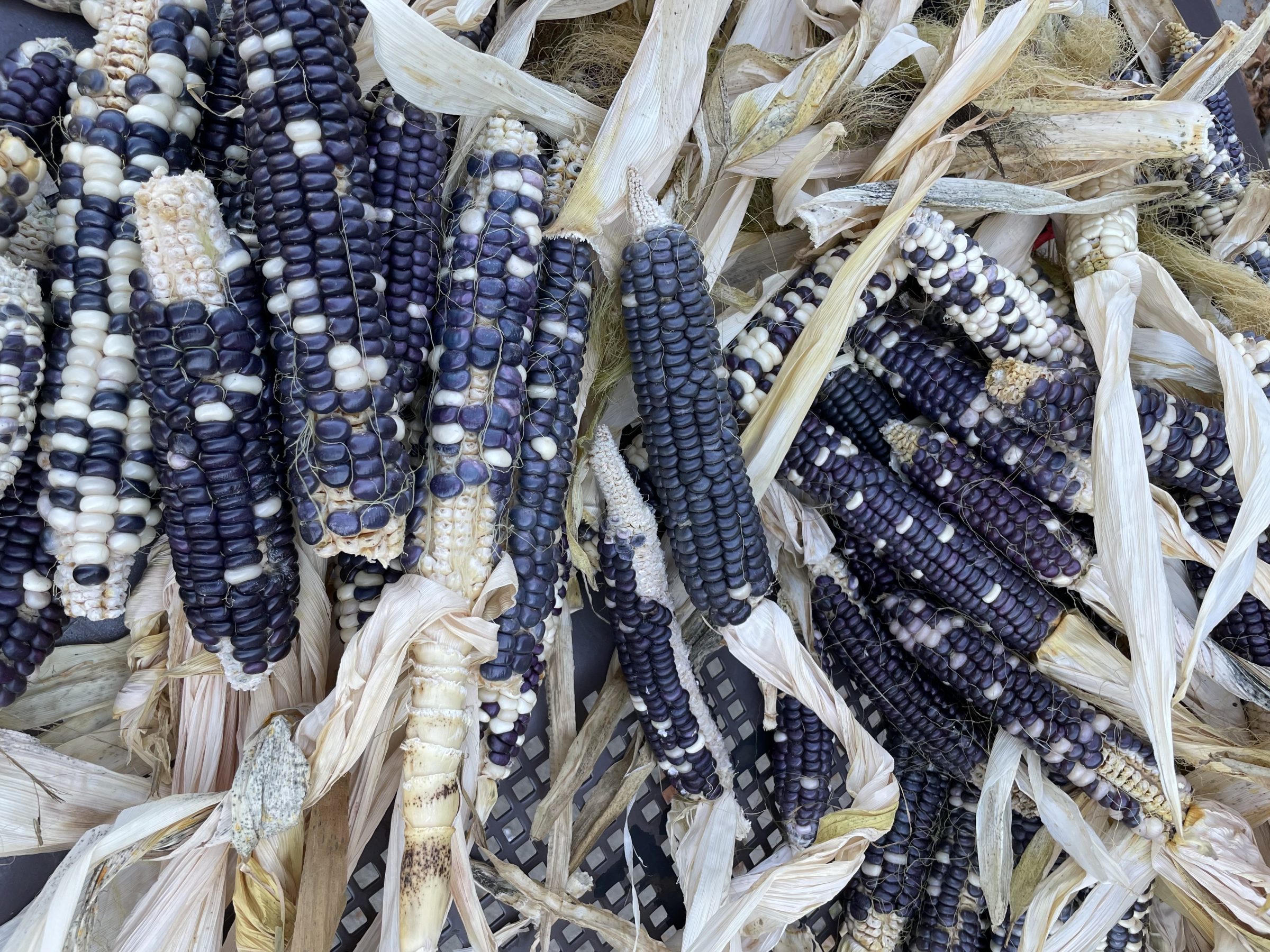
Chainsaw Safety Training 1 & 2 at Mino Bimaadiziiwin Tribal Farm
April 15-16, 2026 in Bayfield, WI
The Mino Bimaadiziiwin Tribal Farm in Red Cliff and Indigenous Food Systems Resilience Project are hosting a Safety and Woods Working (SAWW) level 1 & 2 chainsaw safety training for Tribal members and producers.
Topics covered include personal protective equipment, body mechanics and situational awareness, chainsaw safety features, planning and executing tree felling and limbing/bucking, basic chainsaw maintenance, overview of chain types and parts, introduction to using wedges.
Registration coming soon! Email Hannah Arbuckle (harbuckle@wisc.edu) with questions.
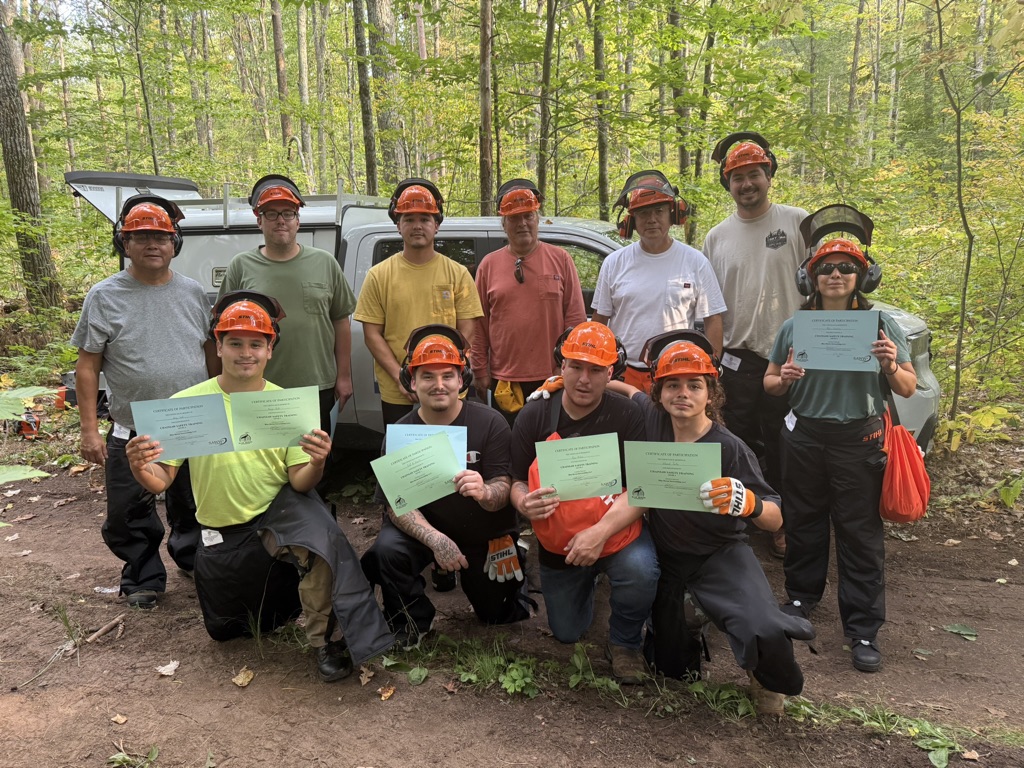
Tractor Safety Training at Mino Bimaadiziiwin Tribal Farm
April 17, 2026 in Bayfield, WI
The Mino Bimaadiziiwin Tribal Farm in Red Cliff and Indigenous Food Systems Resilience Project are hosting a Tractor Safety Training for Tribal staff and producers. The hands-on training will cover the basics of safely operating a tractor.
Morning classroom session: introduction to farm equipment safety, tractor and implement hazards, hand signals and communication, and pre-operation safety checks.
Afternoon hands-on sessions: walk around inspection, safety scenario role play, 3-point hitch and PTO connections, front-end loader / skidsteer operation, cultivating tractor applications
Funding is available to reimburse Tribal members and Tribal staff members from Tribes in Wisconsin for mileage, per diem, and hotel through the Wisconsin Tribal Conservation Advisory Council. Eligible participants interested in travel reimbursement will be contacted by WTCAC to arrange payment. More information in the registration form below.
Registration coming soon! Reach out to Hanna McIntosh (hanna.mcintosh@wisc.edu) with questions.
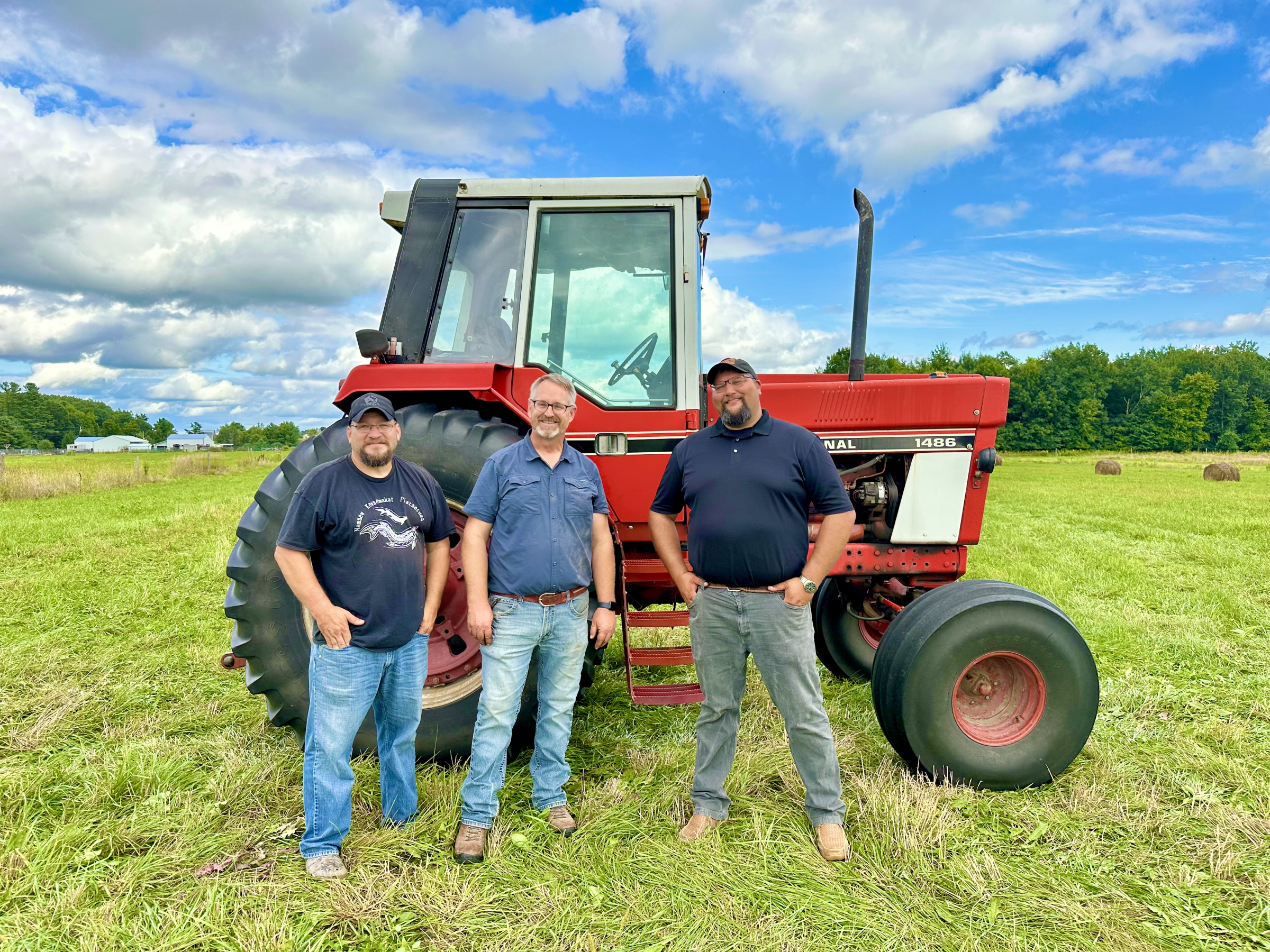
Past events
Sugar Maple Storytelling Online Gathering
February 12, 2026 from 6-7:30 PM on Zoom
Join the UW-Madison Indigenous Food Systems Resilience Project and the Wisconsin Tribal Maple Sugaring Network for an online gathering to start the maple sugaring season. Community members from across sugar maple territory will join together to reflect on their relationship with ininaatig (maple tree in the Ojibwe language). A panel of seasoned harvesters will share stories, concerns, and teachings to guide how future generations care for ininaatig
Panelists
- Marvin Defoe (Red Cliff)
- Biskakone Greg Johnson (Lac du Flambeau)
- Maria Nevala (Bad River)
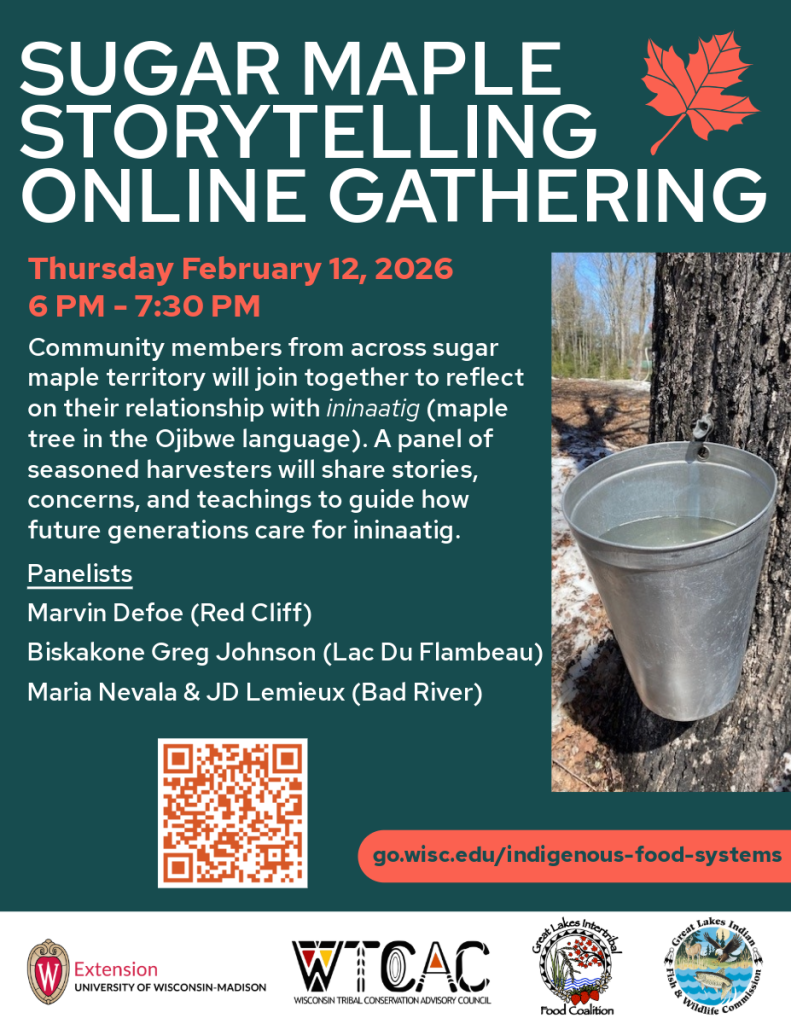
Tree Fruit Pruning Workshop
February 9, 2026 from 12-3 PM at Mino Bimaadiziiwin Farm in Red Cliff
Join the UW-Madison Indigenous Food Systems Resilience Project and Red Cliff Mino Bimaadiziiwin Farm for a hands-on Tribal staff and producer training covering fruit tree pruning best practices.
Instructor: Josie Dillon, UW-Extension Statewide Fruit Outreach Specialist
What you will learn:
- Why pruning is important for fruit tree health
- How to select branches to remove
- Practice pruning with proper technique and tools
- How to care for different aged trees (new trees and very old trees)
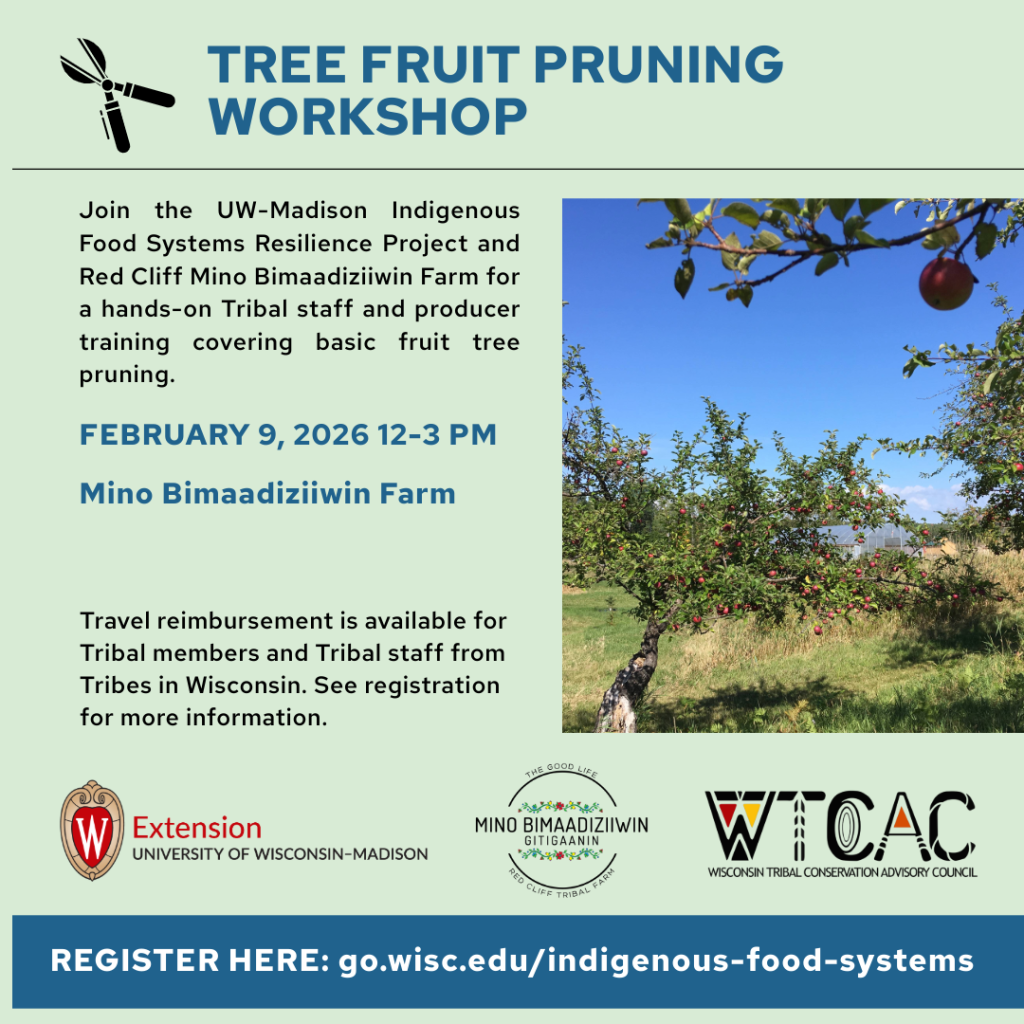
Tiny Teachers: Learning From Insects Webinar Series
October, 2025 – February, 2026 from 5:30-6:30 PM on Zoom
Insects are everywhere and we have a lot to learn from them! What makes an insect an insect? Who are the insects we see around us every day? Why are they important members of our communities? How do we help them thrive? What do we do when they’re eating our gardens or fields?
Join the UW-Madison Rural Partnerships Institute Indigenous Food Systems Project for this interactive webinar series to learn from insects, food producers, and entomologists with a focus on Indigenous food systems. The webinars will include short presentations and time for questions from the audience.
- October 15: Entomology 101 with Willow Lovecky (Taos Pueblo) and Jade Kochanski
- October 28: Creating Habitat for Beneficial Insects with Cheyenne Reuben-Thomas (Oneida) and Skye Bruce
- November 19: Bees! from Pollination to Honey with Bill Mott (Menominee) and Jade Kochanski
- December 4: Basic Scouting for Pests in your Garden or Field with Ari Abbrescia and Emilee Gaulke
- February 5: Indigenous Insect Legends with Hope Flanagan (Seneca)
Do you have an insect question that’s bugging you? Entomology experts will join the webinars to help answer questions and share resources in the chat.
Email Hanna McIntosh (hanna.mcintosh@wisc.edu) with questions.
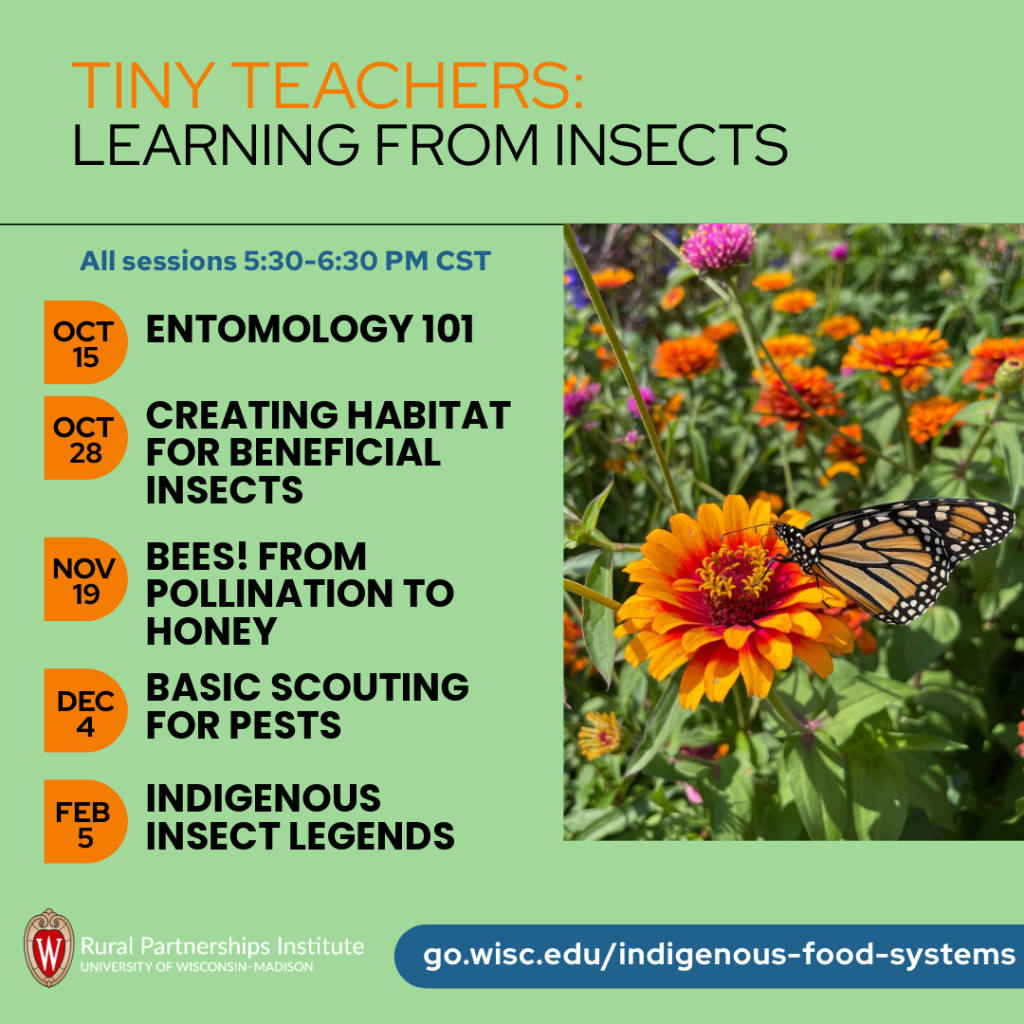
WTCAC Agriculture Subcommittee Meeting & Emerging Contaminants Training
Wisconsin Tribal Conservation Advisory Council Agriculture Subcommittee
January 13, 2025 from 12-3 PM in Keshena, WI
The WTCAC Agriculture Subcommittee will serve as a connector between Tribal Nation staff and UW-Madison and Extension to support Tribal-university partnerships and address Tribal agricultural needs. The Agriculture Subcommittee will be an informal space for sharing Tribal needs and ideas that can be supported by WTCAC and UW-Madison Extension
Emerging Contaminants in Food Systems Training
January 14, 2025 from 9 AM – 3:30 PM in Keshena, WI
Learn about two emerging contaminants of concern– neonicotinoids and PFAS. This training will cover neonicotinoid and PFAS use across the state and its environmental fate in Wisconsin’s waters and culturally important foods like wild rice, maple syrup, and more.
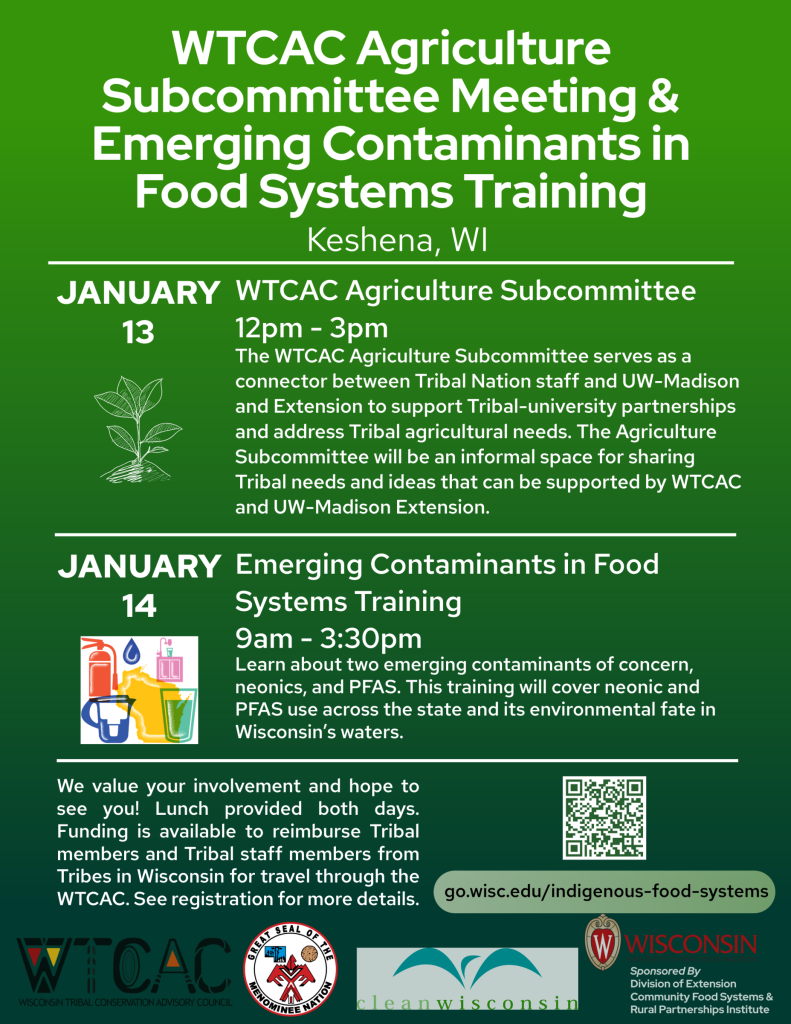
Maple Tubing System Installation Workshop
November 17 from 9 AM – 5 PM in Odanah, WI
Join Bad River Food Sovereignty to install a maple tubing system for maple syrup production, with assistance from the Menominee Department of Agriculture and Food Systems and their maple tubing installation trailer. Breakfast and lunch are provided.
Email Hannah Arbuckle (harbuckle@wisc.edu) with questions.
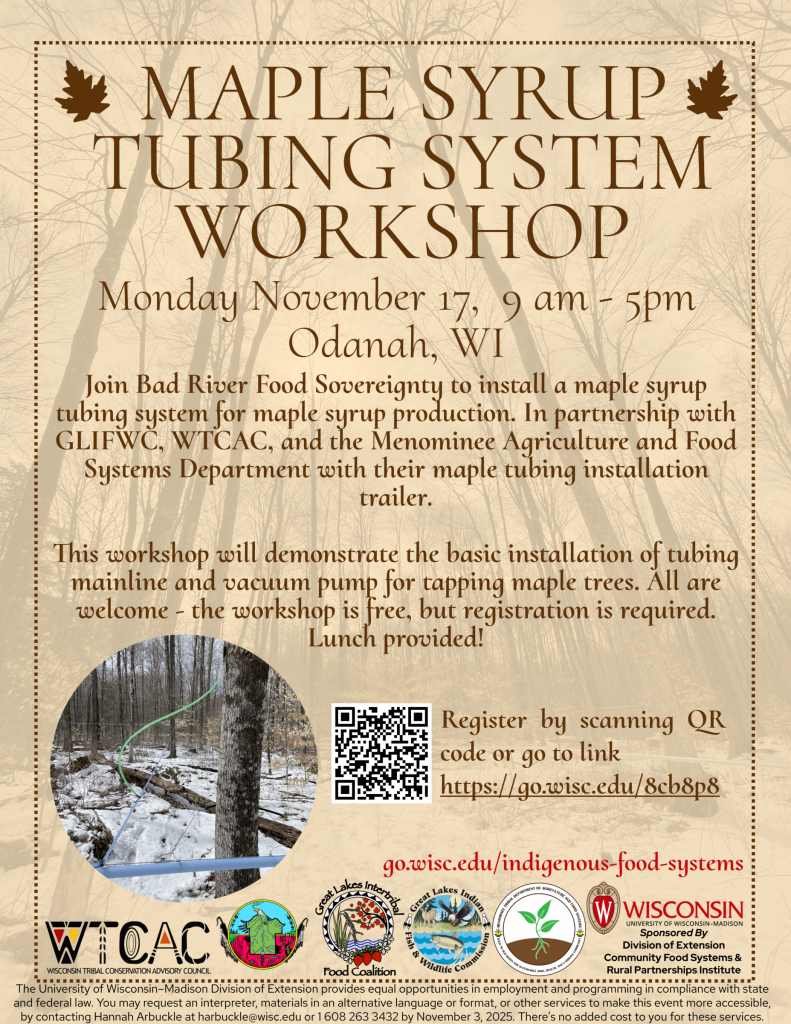
Intertribal Harvest Gathering
October 2-3 in Baraboo, WI
The Ho-Chunk Department of Agriculture hosted an Intertribal Harvest Gathering in Baraboo. Approximately 200 participants enjoyed workshops, demonstrations, chefs, artists, and a mini Indigenous Producer Academy covering topics like soil health, cover crops, planting and cultivating techniques, seed saving, and equipment safety. Check out the event summary on their website!
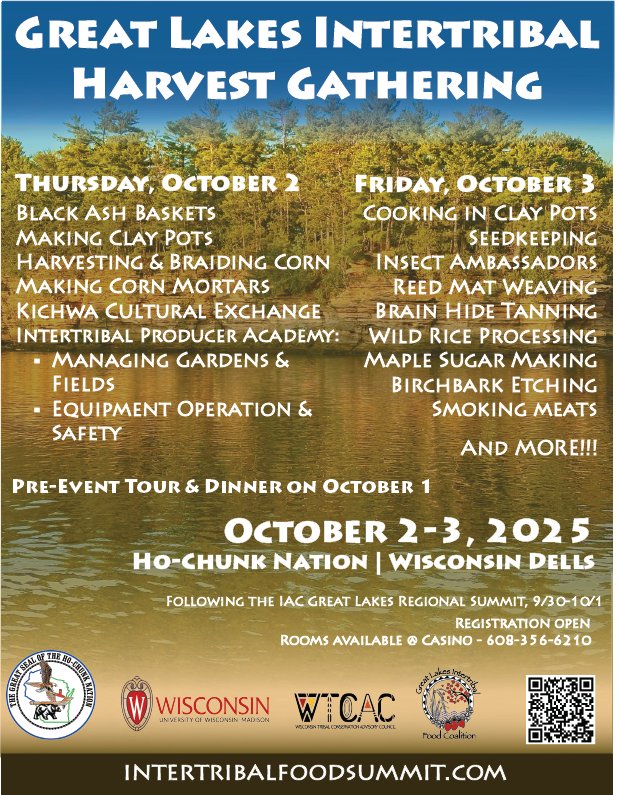
Chainsaw Safety Training 1 & 2 at Menominee
September 15-16 or 17-18, 2025 in Keshena, WI
The Menominee Department of Agriculture and Food Systems is hosting two Safety and Woods Working (SAWW) level 1 & 2 chainsaw safety training for Tribal members and producers.
Topics covered include personal protective equipment, body mechanics and situational awareness, chainsaw safety features, planning and executing tree felling and limbing/bucking, basic chainsaw maintenance, overview of chain types and parts, introduction to using wedges.
Email Hannah Arbuckle (harbuckle@wisc.edu) with questions.

Tractor Safety Training at Menominee
August 19, 2025 in Keshena, WI
The Menominee Department of Agriculture and Food Systems and Northcentral Technical College are hosting a one-day tractor safety training with support from the RPI Indigenous Crops & Livestock Team. The hands-on training will cover the basics of safely operating a tractor.
Morning classroom session: introduction to farm equipment safety, tractor and implement hazards, hand signals and communication, and pre-operation safety checks.
Lunch provided by Menominee Department of Agriculture and Food Systems.
Afternoon hands-on sessions: walk around inspection, safety scenario role play, 3-point hitch and PTO connections, front-end loader / skidsteer operation, cultivating tractor applications
Funding is available to reimburse Tribal members and Tribal staff members from Tribes in Wisconsin for mileage, per diem, and hotel through the Wisconsin Tribal Conservation Advisory Council. Eligible participants interested in travel reimbursement will be contacted by WTCAC to arrange payment. More information in the registration form below.

Milwaukee Indigenous Urban Agriculture Tour
July 23-25, 2025 in Milwaukee, WI
In partnership with Bad River Food Sovereignty and the Ho-Chunk Department of Agriculture, the Community Food Systems Team is hosting a tour of urban Indigenous agriculture. This tour will showcase Indigenous-led food and agriculture projects in the greater Milwaukee Metro area such as the Native Wellness Garden at the Gerald L. Ignace Indian Health Center, Hunger Task Force Farm, Marquette University Indigeneity Lab and Wild Rice Project.
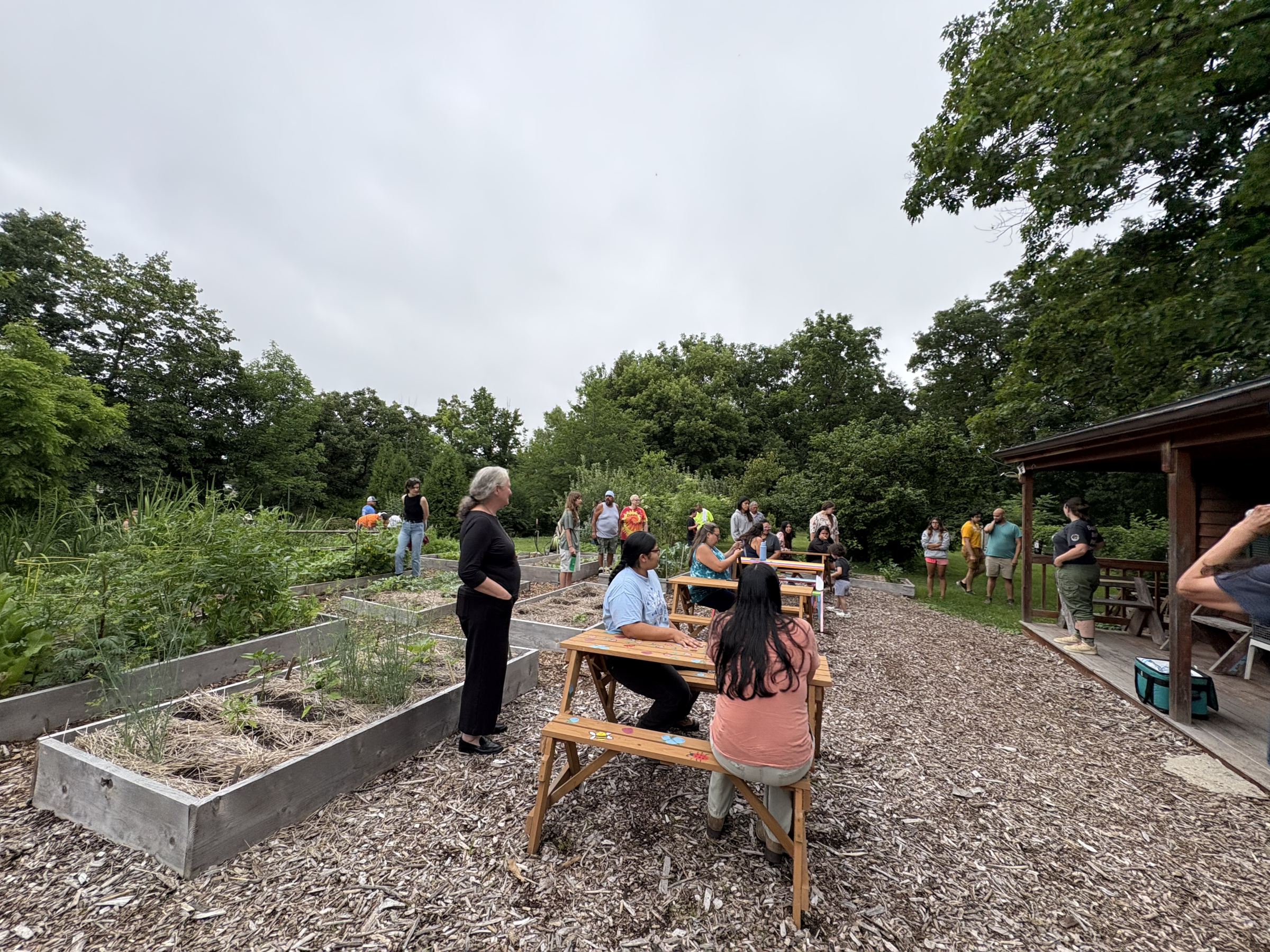
Food Safety Alliance Training hosted by Bad River
June 23-25, 2025
The Community Food Systems Team is partnering with the Wisconsin Tribal Conservation Advisory Council to host a Produce Safety Alliance Training for Tribal producers. The training will provide education on best practices for insuring produce is grown, harvested, and packaged in a safe way to help prevent the spread of bacterial, viral, and parasitic disease. Those who complete the training will receive a certification which is required for certain food production operations.
Additional training will include wholesale readiness, Tribal Elder Food Box, GLIFWC Traditional Food Regulatory System (Model Food Code), and Waawaashkeshi (venison) under the Model Food Code.

High Tunnel Management Workshop hosted by Red Cliff
June 25, 2025 at 1:00-4:00 PM
Our partners at the Wisconsin Tribal Conservation Advisory Council is hosting a high tunnel management workshop in collaboration with the Red Cliff Mino Bimaadiziiwin Farm.
Tentative agenda:
1:00 pm Farm Tour
1:45 pm Presentation on high tunnel infrastructure and operations
2:30 pm Presentation on high tunnel related NRCS practices and EQIP
3:15 pm Group Discussion and Q & A
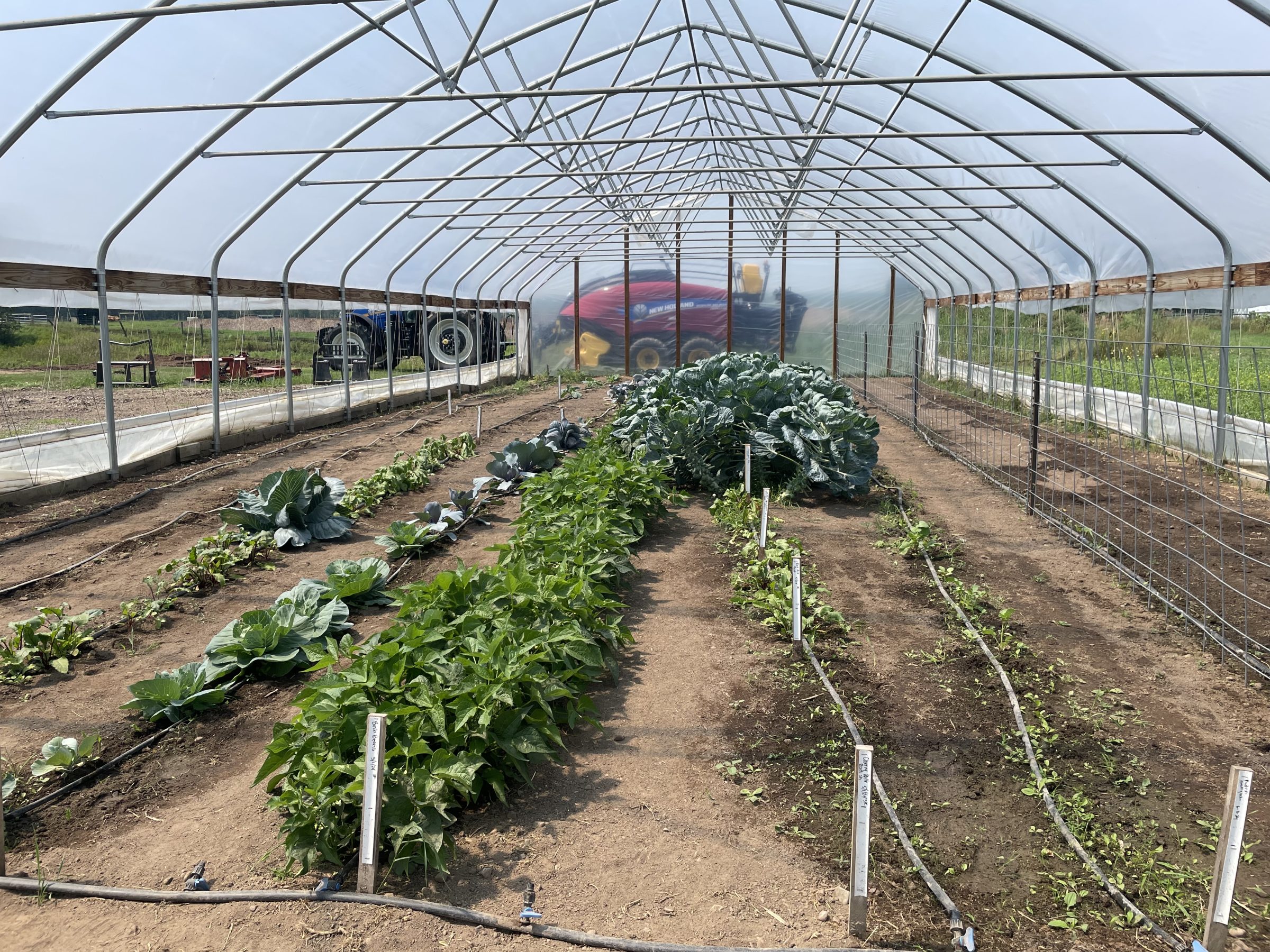
Arboretum Indigenous Research Garden Planting Day
May 21, 2025 from 4-6 PM at the Arboretum Indigenous Research Garden in Madison.
Join the Indigenous Crops & Livestock Team at the Arboretum Indigenous Research Garden to help weed the mounds area and plant corn and strawberries.
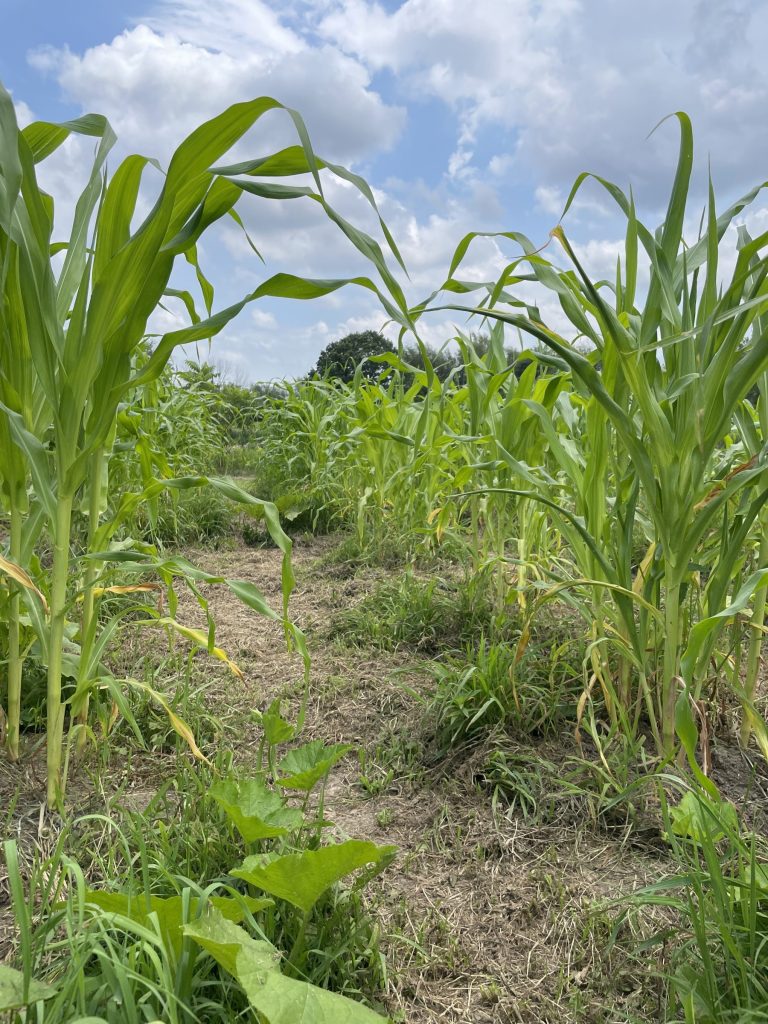
Sugarbush Management Training
May 8, 2025 in Gresham, WI
The Extension Maple Program and UW-Stevens Point are hosting a sugarbush management training in Gresham. Managing maple stands for sustainable sap production presents unique challenges. The sentiment that you “don’t cut sugar maple” could use some critical thinking and review. In this workshop, we will explore maple sugaring, state and federal policies regarding sugarbush management, and timber marking for sugar maple stand improvement. This workshop will begin at The Club House Function Suite at Pine Hills Golf Course. Registration closed.
Funding is available to reimburse Tribal members and Tribal staff members from Tribes in Wisconsin for mileage, per diem, and hotel through the Wisconsin Tribal Conservation Advisory Council. Eligible participants interested in travel reimbursement will be contacted by WTCAC to arrange payment.
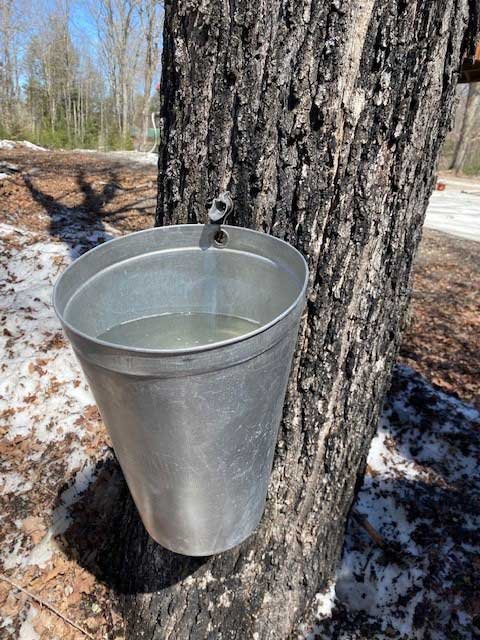
Tractor Safety Training
April 8, 2025 from 9:30 AM – 4:30 PM at Arlington Agricultural Research Station in Arlington, WI
Join the Indigenous Crops & Livestock Team for a full-day tractor safety training for Tribal producers and Tribal staff members hosted by the Rural Partnerships Institute Indigenous Food Systems Project and UW Extension in collaboration with the Wisconsin Tribal Conservation Advisory Council. Instructors Brian Luck and John Shutske will provide a general introduction to equipment safety and the basics of tractors and combines in a morning classroom session. In the afternoon, participants will rotate outdoor stations to learn hands-on the basics of tractor operation and safety. Different types of tractors, attachments, and equipment will be provided. Stations will cover getting readying tractors to operate, tractor operation and driving, hooking up and pulling PTO and drawbar implements, trailering safety, and skid steer operation.
Funding is available to reimburse Tribal members and Tribal staff members from Tribes in Wisconsin for mileage, per diem, and hotel through the Wisconsin Tribal Conservation Advisory Council. Eligible participants interested in travel reimbursement will be contacted by WTCAC to arrange payment.
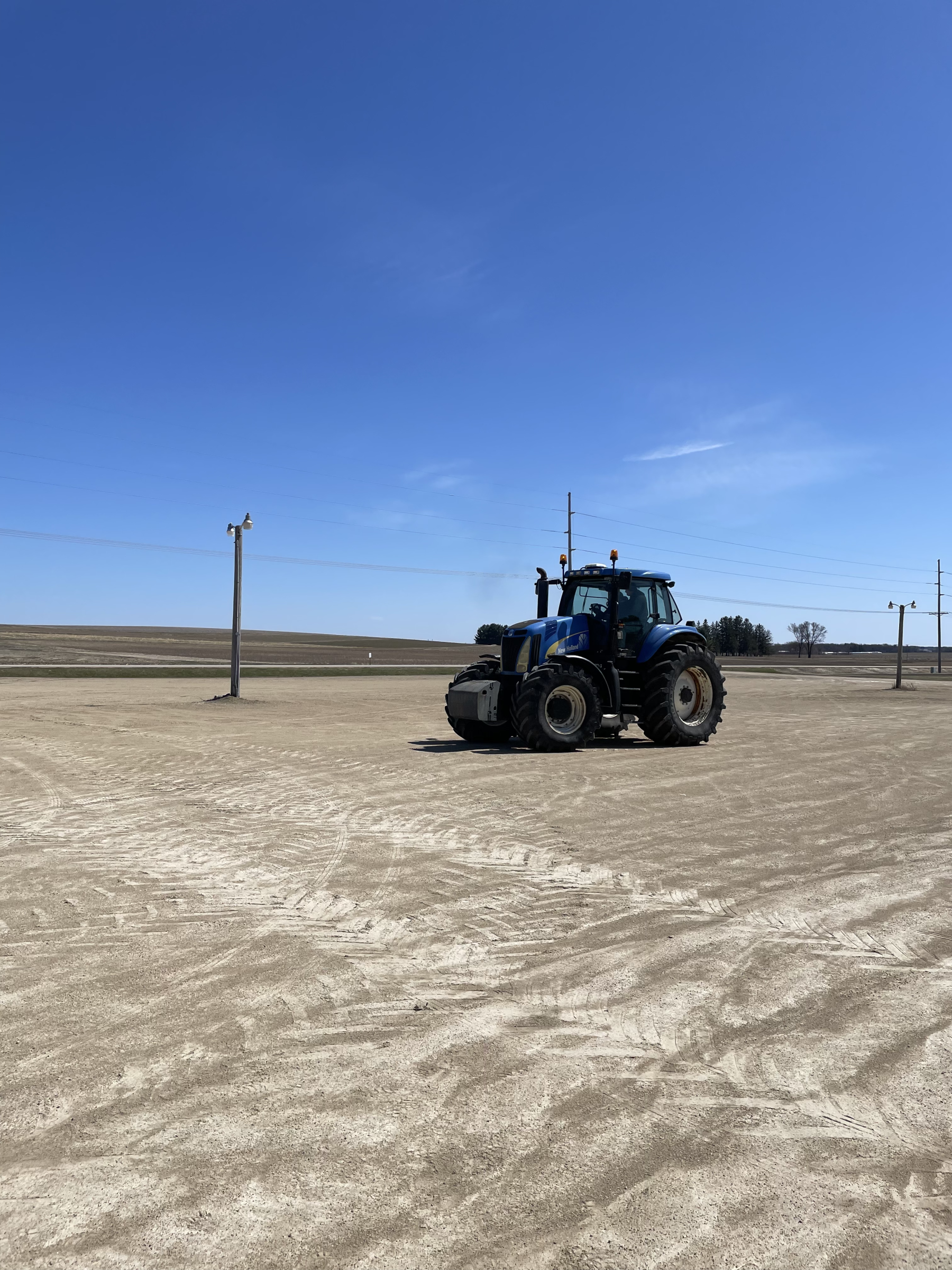
Wisconsin Tribal Maple Network Workshops
Funding is available to reimburse Tribal members and Tribal staff members from Tribes in Wisconsin for mileage, per diem, and hotel through the Wisconsin Tribal Conservation Advisory Council. Eligible participants interested in travel reimbursement will be contacted by WTCAC to arrange payment.
Maple Tubing System Workshop at Menominee
April 3, 2025 from 10:00 AM – 4:00 PM in Keshena, WI
Join the Wisconsin Tribal Maple Network and Menominee Department of Agriculture and Food Systems in collaboration with the Wisconsin Tribal Conservation Advisory Council for a workshop highlighting Menominee’s new maple tubing system. The Menominee Department of Agriculture and Food Systems and Medicine Fish will showcase how the maple syrup tubing system was set up and how the system can maximize maple syrup production for commercial use and gather data on environmental impacts on maple trees.
Maple Operation from Tap to Syrup Workshop at Forest County Potawatomi
April 4, 2025 from 10:00 AM – 2:00 PM in at the Bodwéwadmi Ktëgan Farm
Join the Wisconsin Tribal Maple Network and Bodwéwadmi Ktëgan – Forest County Potawatomi Farm in collaboration with the Wisconsin Tribal Conservation Advisory Council for a workshop on maple syrup production from tap to syrup. Farm Manager David Cronauer will showcase their 1,100-tap operation, reverse osmosis system, evaporator, and bottling system. Lunch provided by Forest County Potawatomi.
Maple Syrup Season Check-in Webinar
March 27, 2025 from 12:00-1:00 PM on Zoom.
Join the Wisconsin Tribal Maple Network us for an informal lunch hour discussion with Tribal maple producers to share and learn how the how maple syrup season has been progressing.
If you are a maple syrup producer we would love to hear from you during this time. Please feel free to share how things are going with your maple operation, photos, stories, and anything else maple related! We look forward to connecting with you all!
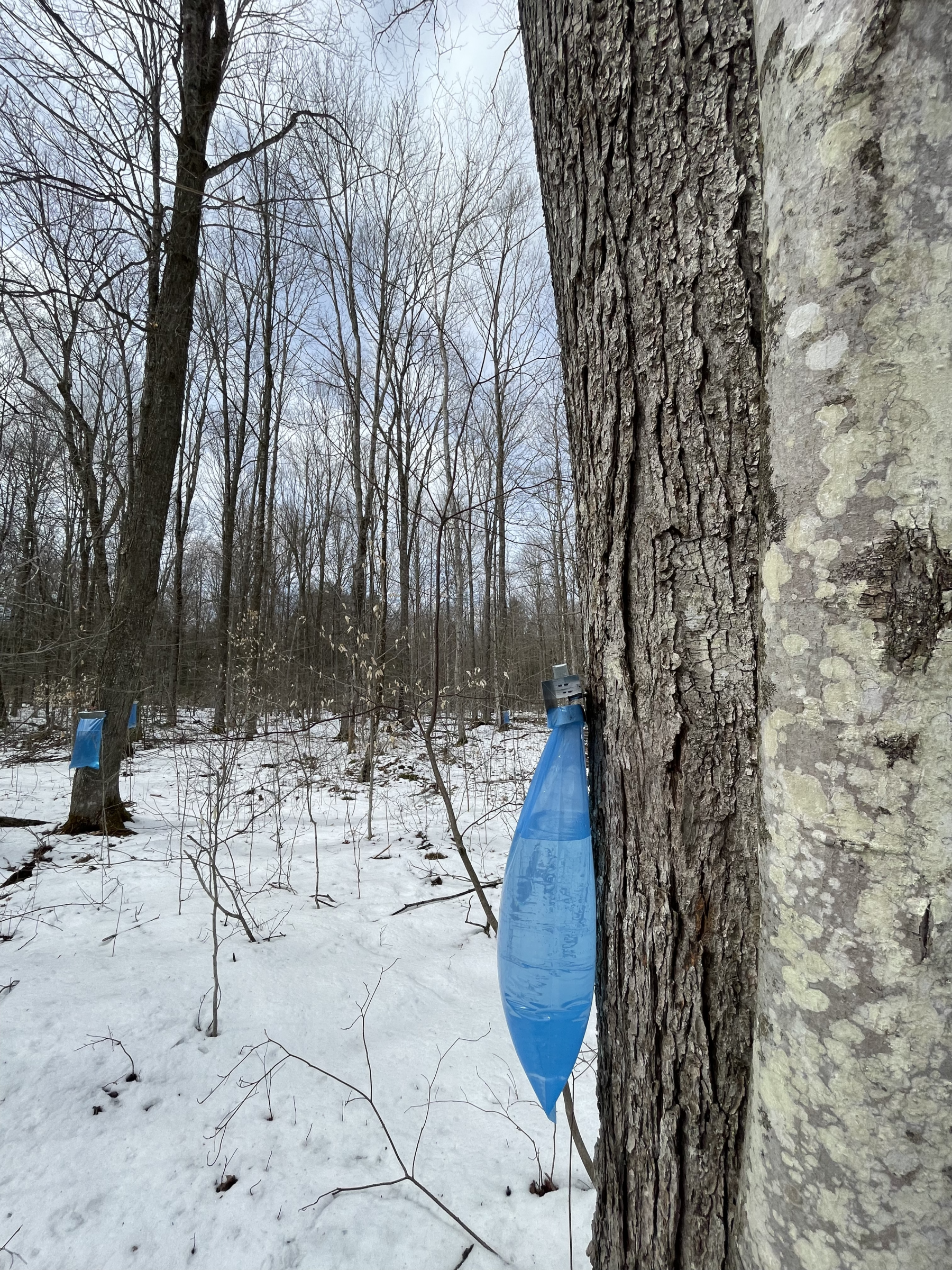
Foundational Indigenous Agronomy Field Training
March 13, 2025 from 9:00 AM – 4:30 PM in Tomah, WI
The Indigenous Crops & Livestock Team and Ho-Chunk Department of Agriculture are collaborating with the Wisconsin Tribal Conservation Advisory Council to host this full-day training on the foundations of Indigenous agronomy for Tribal producers and Tribal staff members. Instructors Will Fulwider and Erin Silva will cover foundational agronomy concepts including basic soil science, nutrient management and organic sources of nutrients, tillage equipment, avoiding or mitigating compaction, organic weed management, and planning rotations. The afternoon will include introduction to equipment implements.
Funding is available to reimburse Tribal members and Tribal staff members from Tribes in Wisconsin for mileage, per diem, and hotel through the Wisconsin Tribal Conservation Advisory Council. Eligible participants interested in travel reimbursement will be contacted by WTCAC to arrange payment.
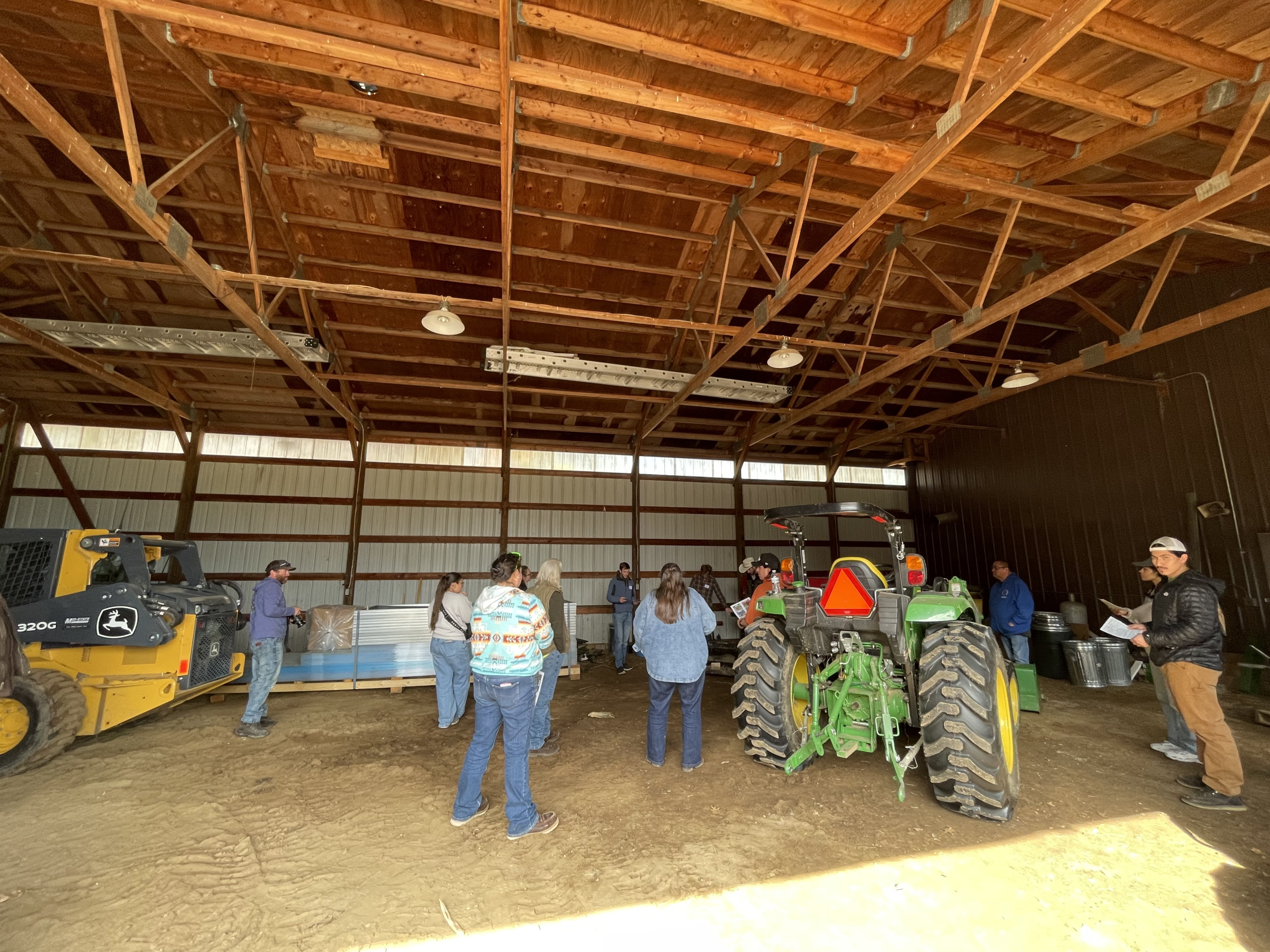
Introduction to Indigenous Agronomy Webinar Series
What is Indigenous agronomy? How can western agronomy be used in Indigenous food systems? How is Indigenous agronomy used in practice? Join the Indigenous Crops & Livestock Team for this interactive webinar series. Please come with your questions, expertise, and knowledge to share.
Indigenous Agronomy in Practice
March 6, 2025 from 6:00-7:30 PM on Zoom
This webinar will highlight a research partnership between UW-Madison PhD student Daniel Hayden (Comanche, UW-Madison doctoral student) and the Ohe·láku corn growers cooperative in Oneida. Daniel Hayden and Lea Zeise (Oneida) will share their collaborative research on intercropping cover crops with Tuscarora white corn and discuss what Indigenous agronomy means to them in practice. Following their presentation will be a community discussion for Tribal producers.
Archaeology and History of Wisconsin’s Native Agriculture
March 19, 2025 from 6:00-7:30 PM on Zoom
A common misperception of ancestral Menominee peoples is that they were hunter-gatherers who practiced little, if any, agriculture in northeastern Wisconsin. Yet, research led by Dr. William Gartner (UW-Madison Department of Geology) in conjunction with the Menominee Cultural Museum’s Culture Camp program shows that ancestral Menominee peoples had a 1000-year-old tradition of raising maize, squash, sunflowers, and other plants in raised fields by the time that the treaties were signed.
Scaling Indigenous Corn Production: From Mounds to Combines
March 27, 2025 from 6:00-7:30 PM on Zoom
This session will follow Indigenous corn seed from planting through the season all the way to harvest and drying before it’s processed to hulled hominy corn for the Tribal Elder Food Box. Each step will be detailed by producer Daniel Cornelius (Oneida, UW-Madison CALS & Law School), including perspectives on scales of production from mounds and hand planting to mechanical corn planters and combine harvesters. Expanding the processing scale to meet the nearly two thousand units required for the Tribal Elder Food Box will also be covered.
Basics of Agronomy
April 1, 2025 from 6:00-7:30 PM on Zoom
This webinar will cover introductory agronomy for Tribal producers and Tribal staff members focused on soil structure, biology, nutrients, and soil tests. Bring your questions for instructor Will Fulwider (UW-Extension) and your expertise and knowledge to share in a community discussion.
When Do I Tap My Maple Trees? Webinar
February 5, 2025 from 6:00-7:00 PM on Zoom.
Getting ready to tap? Join the Wisconsin Tribal Maple Network to connect with other Tribal producers and discuss maple tapping conditions, climate, and weather patterns. Panelists Greg Johnson (Lac du Flambeau), Chairman Bruce Savage (Fond du Lac), and Jerry Jondreau (Keweenaw Bay Indian Community) will discuss how they know when to tap, considerations, and their experience adapting to variable weather conditions. Steve Vavrus and Bridgette Mason of the Wisconsin State Climatology Office will share a short presentation about predictions for this year’s season.
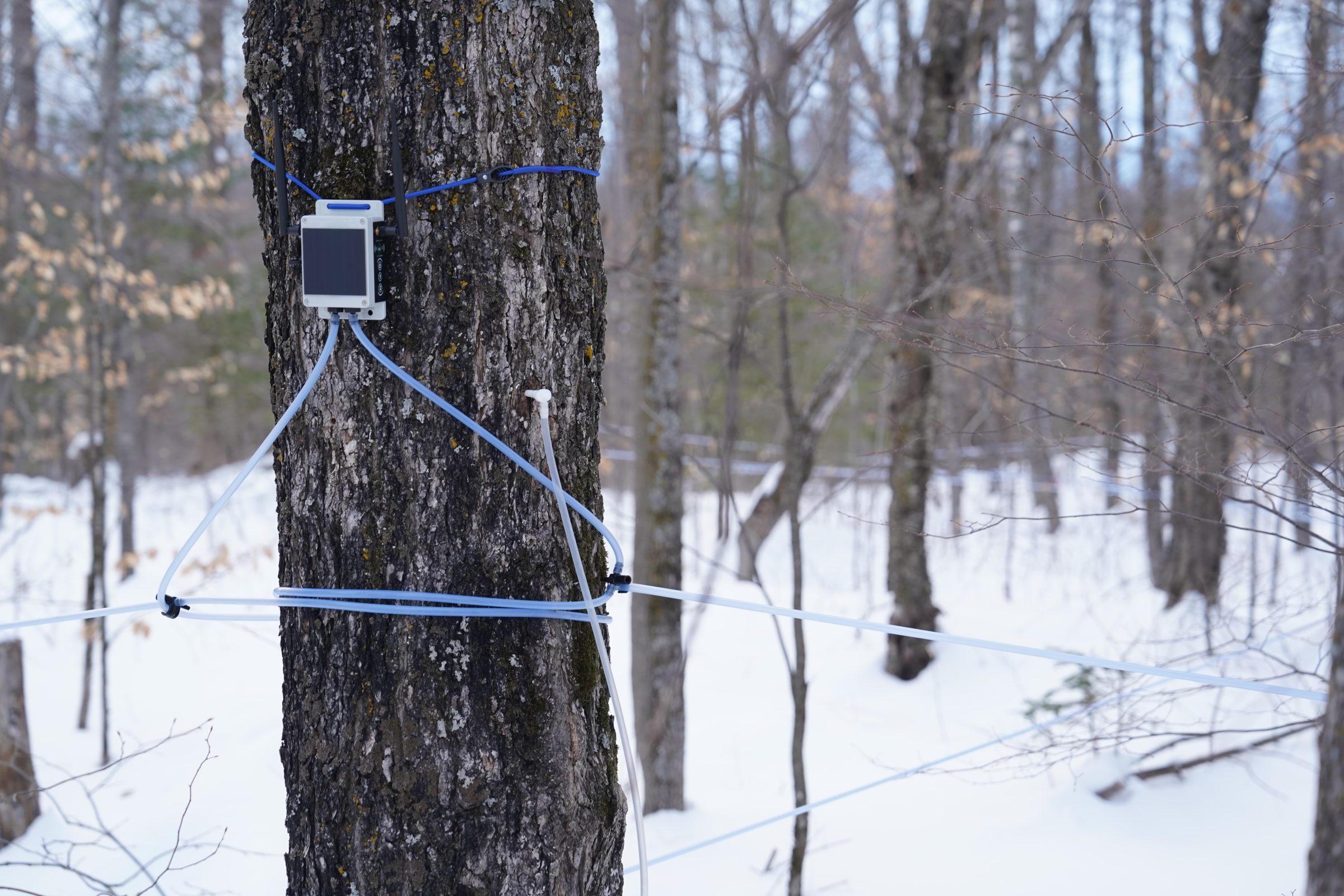
St. Louis River Estuary Wild Rice Camp
September 17, 2024 in Superior, WI
The Manoomin Team is partnering with the UW–Superior Indigenous Cultures Resources Center to host a wild rice camp for students to learn about manoomin harvesting. Local elders and Tribal community members will share their time and knowledge with students, taking them through each step of harvesting and finishing, while also sharing the spiritual and physical importance of manoomin.
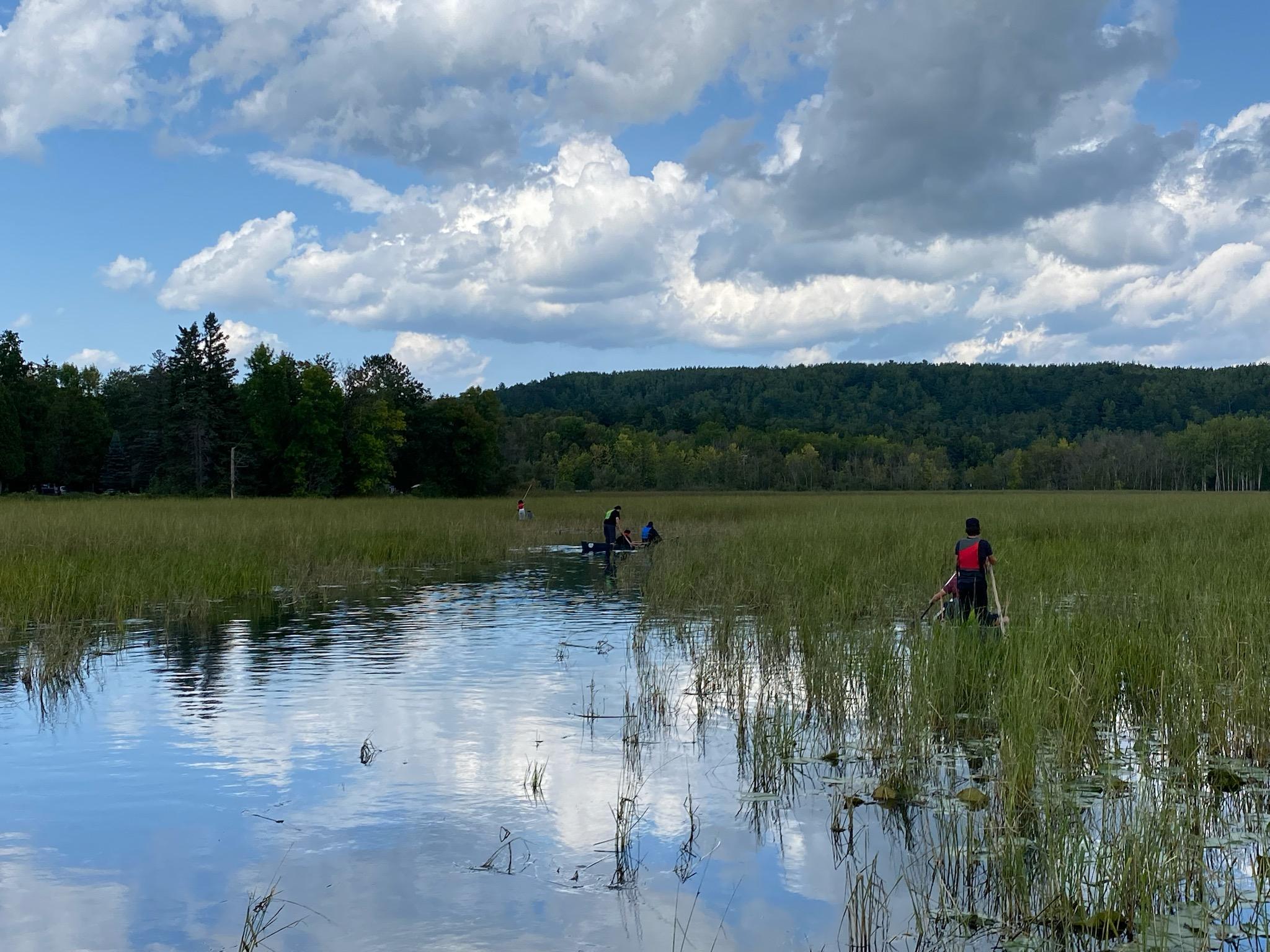
Indigenous Producer Academy
July 30-31, 2024 in Forest County Potawatomi and Menominee
The RPI Team is supporting the Indigenous Food Producer Academy organized by the Great Lakes Intertribal Food Coalition, Menominee Department of Agriculture and Food Systems, and Wisconsin Tribal Conservation Advisory Council. The Academy will be at the Forest County Potawatomi Nation Bodwéwadmi Ktëgan Farm on July 30 and the Menominee Department of Agriculture and Food Systems and Floring Farm on July 31. Sessions will feature rotational grazing, beekeeping, high tunnel vegetable production, compost, aquaponic production of fish and greens, business planing, and grazing plans.
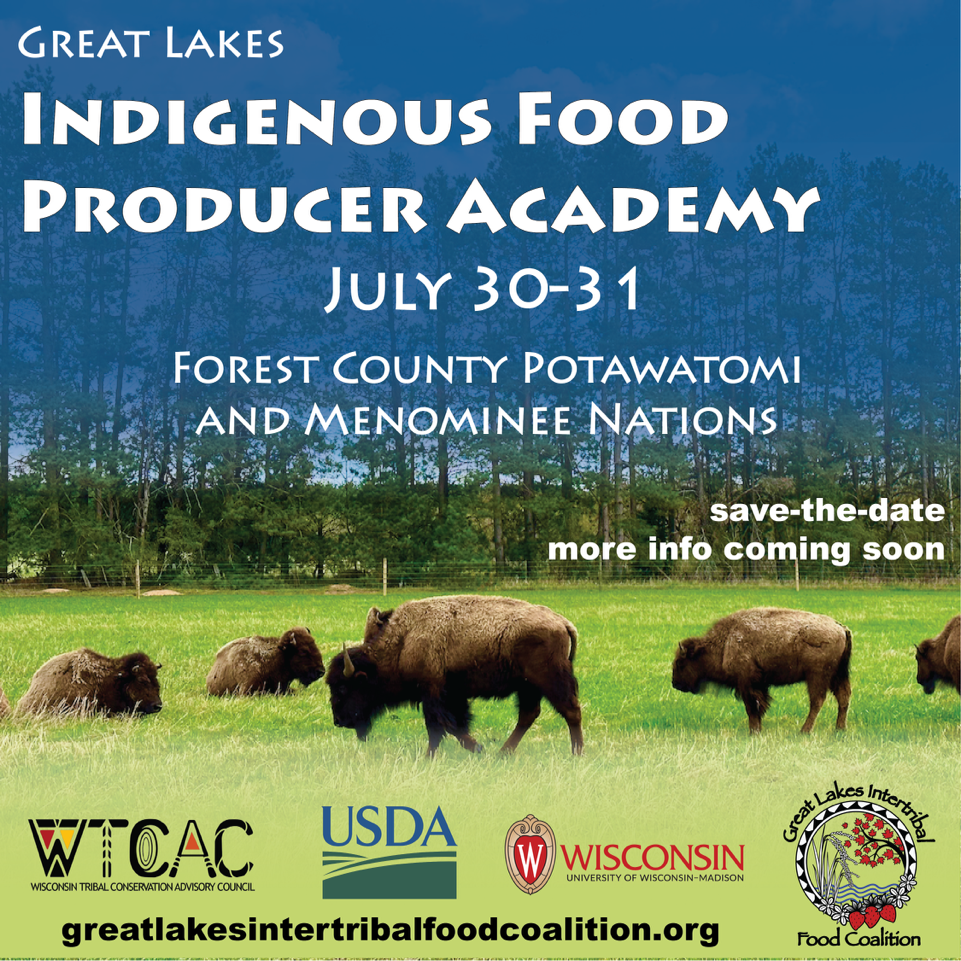
Maple Syrup Season Debrief Webinar
May 21, 2024 from 6:00-7:30 PM on Zoom
Maple season started early this year due to unusually warm weather in January. The Wisconsin Tribal Maple Network and the Wisconsin Tribal Conservation Advisory Council will host a virtual maple season debrief to provide a space for Tribal producers to learn about and discuss their experiences. The event will include a short talk by Wisconsin State Climatologist Steve Vavrus about the climate conditions affecting this year’s maple season, introduction to the Indigenous Climate Resilience Network, and a panel of Tribal sugar producers led by Jerry Jondreau (Dynamite Hill Farms).
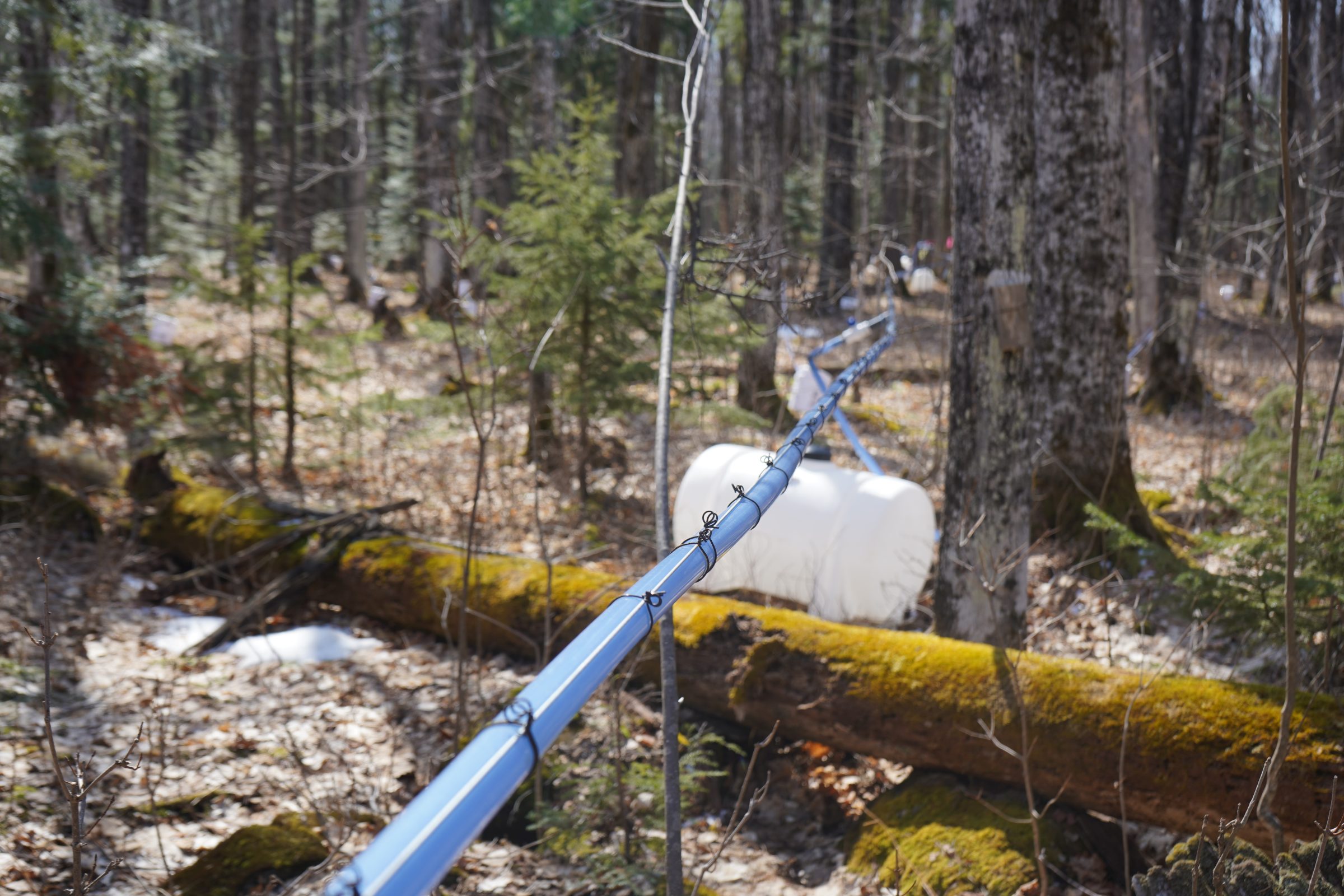
Indigenous Research Forum
May 21, 2024 from 6:00-7:30 PM on Zoom
The RPI Team is part of an interdisciplinary team spanning multiple UW–Madison units and departments co-organizing an Indigenous Research Forum. The event will explore the concept of research as it relates to supporting Indigenous communities and feature a mix of poster conversations, lightning talks, and presentations by speakers engaging in Indigenous research led by and benefitting Indigenous communities. The Indigenous Research Forum is for Tribal members and community members who are interested in learning about and supporting Indigenous research.

